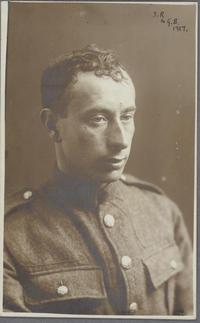Intro to WW1 Poetry: Isaac Rosenberg

Image © Imperial War Museum / The Isaac Rosenberg Literary Estate
Note: For a more in depth look at the poet Isaac Rosenberg and his poetry, please have a look at the seminar 'Break of Day in the Trenches', which features a close study of this poem, and also provides some historical and literary contextual information.
Below is a small selection of his poetry:
Returning, We Hear the Larks
Sombre the night is.
And though we have our lives, we know
What sinister threat lurks there.Dragging these anguished limbs, we only know
This poison- blasted track opens on our camp -
On a little safe sleep.But hark! joy - joy - strange joy.
Lo! heights of night ringing with unseen larks.
Music showering our upturned list'ning faces.Death could drop from the dark
As easily as song -
But song only dropped,
Like a blind man's dreams on the sand
By dangerous tides,
Like a girl's dark hair for she dreams no ruin lies there,
Or her kisses where a serpent hides.
Poems of the First World War: 'Never Such Innocence', ed. Martin Stephen (Everyman, 1995) , p.169
Dead Man's Dump
The plunging limbers over the shattered track
Racketed with their rusty freight,
Stuck out like many crowns of thorns,
And the rusty stakes like sceptres old
To stay the flood of brutish men
Upon our brothers dear.The wheels lurched over sprawled dead
But pained them not, though their bones crunched;
Their shut mouths made no moan,
They lie there huddled, friend and foeman,
Man born of man, and born of woman;
And shells go crying over them
From night till night and now.Earth has waited for them,
All the time of their growth
Fretting for their decay:
Now she has them at last!
In the strength of her strength
Suspended - stopped and held.What fierce imaginings their dark souls lit?
Earth! Have they gone into you?
Somewhere they must have gone,
And flung on your hard back
Is their souls' sack,
Emptied of God-ancestralled essences.
Who hurled them out? Who hurled?None saw their spirits' shadow shake the grass,
Or stood aside for the half-used life to pass
Out of those doomed nostrils and the doomed mouth,
When the swift iron burning bee
Drained the wild honey of their youth.What of us who, flung on the shrieking pyre,
Walk, our usual thoughts untouched,
Our lucky limbs as on ichor fed,
Immortal seeming ever?
Perhaps when the flames beat loud on us,
A fear may choke in our veins
And the startled blood may stop.The air is loud with death,
The dark air spurts with fire,
The explosions ceaseless are.
Timelessly now, some minutes past,
These dead strode time with vigorous life,
Till the shrapnel called 'An end!'
But not to all. In bleeding pangs
Some borne on stretchers dreamed of home,
Dear things, war-blotted from their hearts.A man's brains splattered on
A stretcher-bearer's face;
His shook shoulders slipped their load,
But when they bent to look again
The drowning soul was sunk too deep
For human tenderness.They left this dead with the older dead,
Stretched at the cross roads.
Burnt black by strange decay
Their sinister faces lie,
The lid over each eye;
The grass and coloured clay
More motion have than they,
Joined to the great sunk silences.Here is one not long dead.
His dark hearing caught our far wheels,
And the choked soul stretched weak hands
To reach the living word the far wheels said;
The blood-dazed intelligence beating for light,
Crying through the suspense of the far torturing wheels
Swift for the end to break
Or the wheels to break,
Cried as the tide of the world broke over his sight,
'Will they come? Will they ever come?'
Even as the mixed hoofs of the mules,
The quivering-bellied mules,
And the rushing wheels all mixed
With his tortured upturned sight.So we crashed round the bend,
We heard his weak scream,
We heard his very last sound,
And our wheels grazed his dead face.
Poems of the First World War: 'Never Such Innocence', ed. Martin Stephen (Everyman, 1995), pp.148–50
Explore the tutorial analysing the manuscripts of this poem here.



